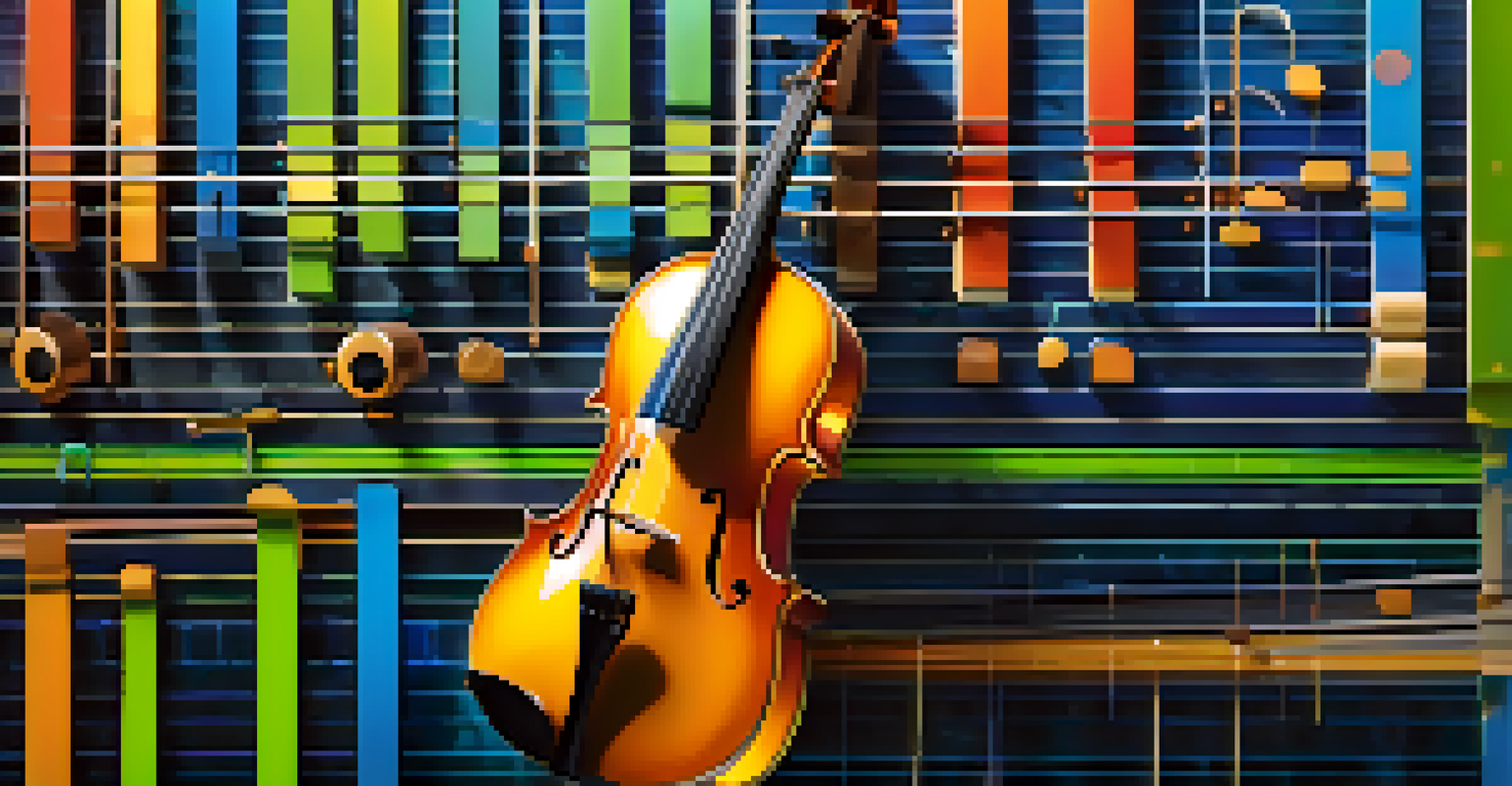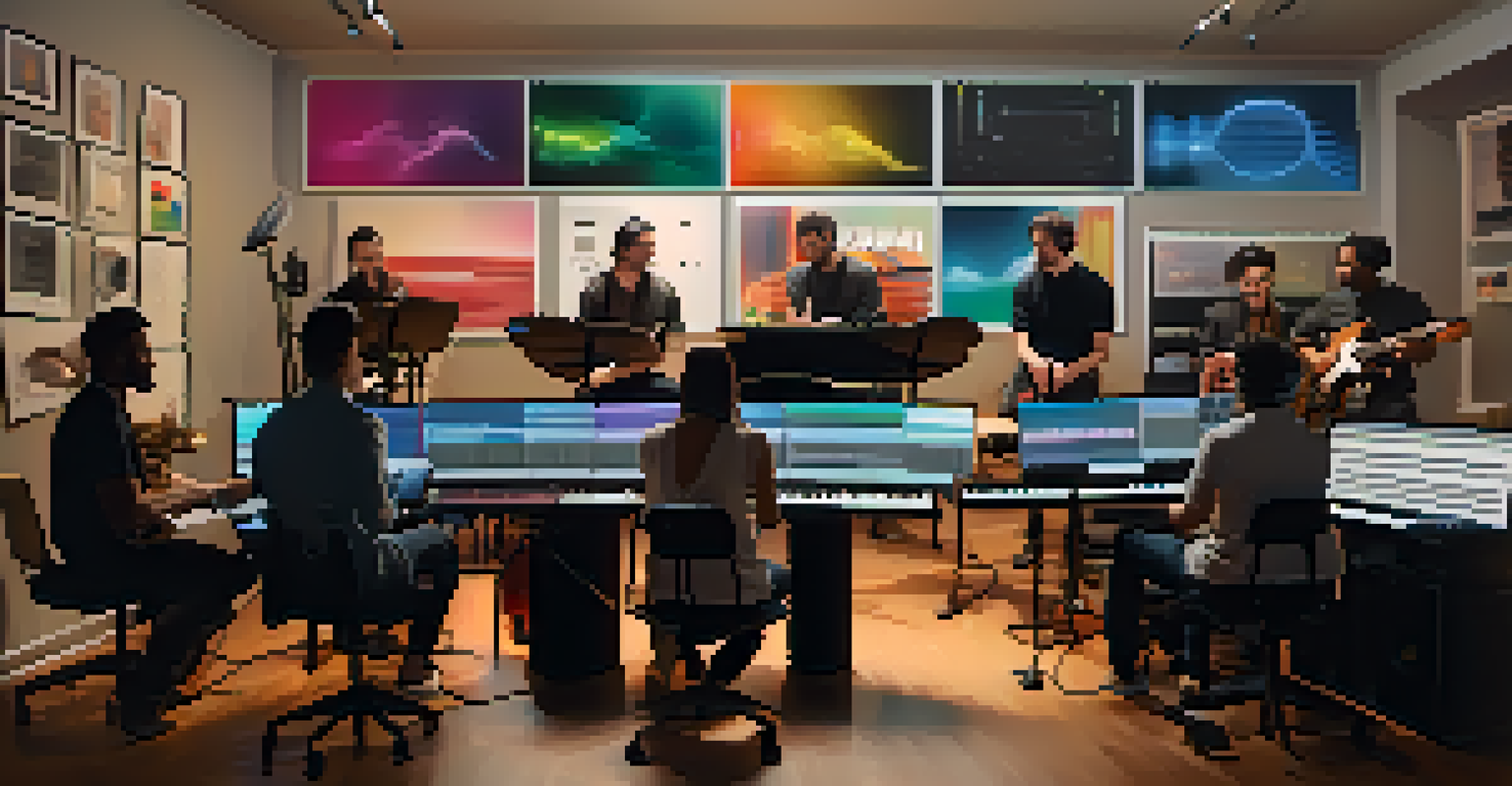The Impact of Technology on Modern Film Scoring Techniques

The Evolution of Film Scoring in the Digital Age
Film scoring has undergone a remarkable transformation since the early days of cinema. With the advent of digital technology, composers now have access to advanced tools that enhance their creative capabilities. This evolution has shifted the landscape from traditional orchestral arrangements to innovative, hybrid approaches that blend live instruments with electronic sounds.
Film music is a powerful tool that can enhance the emotional impact of a film, creating an unforgettable experience for the audience.
For instance, composers can now layer sounds and manipulate them in ways that were previously impossible. The use of digital audio workstations (DAWs) allows for real-time editing and experimentation, giving artists more freedom to explore their musical ideas. This flexibility not only streamlines the scoring process but also opens up a world of sonic possibilities.
As we delve deeper into the impact of technology, it's vital to recognize how these advancements have changed the expectations of film scoring. Modern audiences now crave unique and immersive soundtracks that enhance their viewing experience, pushing composers to adapt and innovate continually.
The Role of Software in Composing and Arranging
Software has become an essential part of the film scoring process. Programs like Logic Pro, Sibelius, and Pro Tools allow composers to create intricate scores with ease. These tools enable composers to write, arrange, and produce music all in one place, drastically reducing the time it takes to finalize a score.

Moreover, software provides access to vast libraries of virtual instruments that can replicate the sounds of orchestras, choirs, and even unique instruments from around the world. This means that a composer can produce high-quality soundtracks without the need for a full orchestra, which is especially valuable for independent filmmakers working with tight budgets.
Digital Tools Revolutionize Scoring
Advancements in digital technology have transformed film scoring, allowing composers to blend live instruments with electronic sounds for innovative soundtracks.
However, while technology offers these conveniences, it also presents challenges. The abundance of choices can lead to decision fatigue, and there's a risk of relying too heavily on software-generated sounds, which may lack the emotional warmth of live performances.
Sampling and Sound Design: A New Frontier
Sampling has revolutionized film scoring by allowing composers to incorporate a wide range of sounds into their music. From everyday noises to unusual instruments, sampling opens up creative avenues that can enhance a film's narrative. For example, the use of ambient sounds can establish a specific mood or setting, making the score an integral part of storytelling.
Technology has changed the way we compose music, allowing us to explore new soundscapes and push the boundaries of our creativity.
Sound design has also become a critical aspect of film scoring. Composers are not just creating melodies; they are crafting entire soundscapes that immerse the audience in the film's world. This trend is evident in genres like science fiction and horror, where sound effects play a crucial role in building tension and atmosphere.
As technology continues to evolve, so too does the art of sampling and sound design. Composers are increasingly experimenting with unconventional sounds and techniques, pushing the boundaries of what film music can be.
Collaboration Tools and Remote Work in Scoring
The rise of collaboration tools has changed how composers work with directors and producers. Cloud-based platforms like Splice and Soundtrap allow multiple users to work on a project simultaneously, regardless of their physical location. This flexibility is especially beneficial in today's remote work environment, where filmmakers and composers often collaborate from different parts of the world.
These tools not only facilitate communication but also allow for quicker feedback loops. Composers can share their work in real-time, making it easier to incorporate changes and align with the director's vision. This efficiency can lead to more cohesive and impactful scores, as creative input can be integrated more fluidly.
AI Enhances Composing Process
Artificial intelligence is changing the landscape of film scoring by assisting composers with creative tasks and streamlining the composition process.
However, remote collaboration also comes with its challenges, such as potential misunderstandings and the lack of face-to-face interaction. To overcome these hurdles, many composers are finding ways to maintain personal connections, even when working digitally.
Artificial Intelligence: A Game Changer for Composers
Artificial intelligence (AI) is making waves in the film scoring industry, providing tools that can assist composers in various ways. AI algorithms can analyze existing scores and generate new compositions that mimic the styles of renowned composers. This technology can serve as a valuable starting point for composers, especially when facing creative blocks.
Moreover, AI can help streamline the scoring process by automating repetitive tasks, allowing composers to focus on the more artistic aspects of their work. For instance, AI-driven software can assist in arranging music or even generating orchestration suggestions, which can save time and energy.
However, the rise of AI in music composition raises important questions about creativity and originality. While AI can enhance the composing process, it is crucial for composers to maintain their unique voice and artistic integrity amidst these technological advancements.
How Streaming Services Influence Film Scores
The advent of streaming services has significantly impacted how film scores are created and consumed. With platforms like Netflix and Amazon Prime producing an increasing number of original films, there's a growing demand for high-quality soundtracks that can enhance the viewing experience. Composers now have the opportunity to reach wider audiences, but they must also adapt to the changing landscape of film music.
Streaming services often prioritize diverse soundtracks that cater to various tastes, encouraging composers to experiment with different genres and styles. This shift has led to innovative scoring techniques that blend traditional orchestration with contemporary elements, creating fresh and exciting soundscapes.
Streaming Services Shape Soundtracks
The rise of streaming platforms has led to a demand for diverse and high-quality soundtracks, encouraging composers to experiment with different genres and styles.
However, as composers navigate this new terrain, they must also consider how their music will be experienced. With the rise of playlists and curated soundtracks, composers are challenged to create pieces that stand out in a crowded digital space, making originality more critical than ever.
The Future of Film Scoring: Trends to Watch
As technology continues to evolve, so will the landscape of film scoring. One trend to watch is the increasing integration of virtual reality (VR) and augmented reality (AR) in storytelling. This development will likely require composers to adapt their techniques to create immersive soundscapes that enhance the viewer's experience in these new formats.
Additionally, the use of machine learning in music composition is expected to grow, offering composers new tools to explore creativity. These advancements may lead to more personalized soundtracks tailored to individual viewer preferences, making the film experience even more engaging.

Overall, the future of film scoring is bright, filled with exciting possibilities and innovations. As technology continues to shape the industry, composers will undoubtedly find new ways to connect with audiences and push the boundaries of their craft.